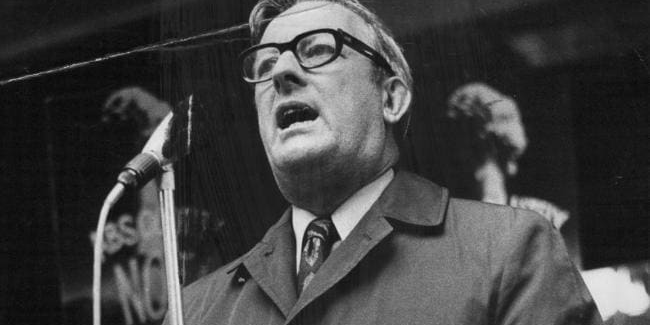Letter to the Editor: Right left, Left right, a response to Arthur Gietzelt’s advocacy of Euro-communism, published in the Nation Review, 9-15 March, 1978, pp. 2-3.

To say that senator Gietzelt’s article (NR, 2 March) is vague would be the least harsh judgement to be made of it. The article does not sustain a coherent thesis, and this letter would be too long and tedious if it were to deal with each elliptical argument, half thought out idea, stale phrase and factual inaccuracy which clogs senator Gietzelt’s argument, if “argument” is the word for the uncritical treatment of the issues raised in his essay.
Propositions are merely stated, others presented with an appearance of argument which would not convince anybody not already convinced on other grounds. For example, senator Gietzelt claims that “every new prescription to make West Germany work and succeed has bred failure” – a characteristic hyperbole and ridiculous account of the impressive reforms of the West German Social Democrat party who manage the most successful economy of western Europe.
But the assertion that really sticks in the throat is the claim that “the way some social democratic leaders behaved in the period of rising fascism” helped to cause “the great ideological schism that led to the formation of the communist parties 50 and 60 years ago.” Anyone with a grain of information about the formation of European communist parties knows that these parties were not suddenly created because of the actions of certain social democratic leaders during the rise of fascism. Indeed, if the period of the rise of fascism refers to the two decades of the 20s and 30s, then this is obviously after the establishment of European communist parties. For example, the GPD was formed in 1919, the UK communist party in 1920 and the Comintern was also set up in 1919.
What is most surprising about senator Geitzelt’s assessment of the rise of Hitler, “a testament to inadequacy and failure”, is the absence of reference to the destructive role of the German communist party which was blindly following the lunatic dictates of the Comintern in denouncing the social democratic leaders as “social fascists”.
The most disturbing aspect of senator Gietzelt’s article is his rejection of social democracy and his warm support for the so-called eurocommunists. Gietzelt approvingly quotes Dennis Altman to the effect that the left should “construct an alternative vision that will replace the social democratic one of Whitlam”, and the important reforms of the Labor government are dismissed in a pithy line: “we tried to do it in the terms of the capitalists.” Whitlam is presented in a very poor light – prepared to go only as far as the people will let him but afraid or unwilling to actually help to “lead them to the left” – whatever that means. What is offered as the alternative vision is an agglomeration of anti-growth rhetoric and convoluted impressions of the “socialist movement” where the movement is somehow defined as on the “upswing”.
The question as to what extent the western Communist parties have been purged of their Stalinist essence is not a matter to be settled by impressionistic gossip or subjective confidence in the declarations and promises of the so called eurocommunists. It should never be forgotten that so long as the western communist parties are organised along the lines of “democratic centralism” the basic personality of these parties remains authoritarian and anti-democratic.Under the system of democratic centralism, meaning a politburo which nominates and controls the members of the central committee and the delegates to the party congresses, the deliberations of the rank and file are merely phoney discussions completely orchestrated from above.
How can the communist parties which now profess to have discovered the democratic road to communism inspire any confidence, given the fact that they do not tolerate any semblance of democracy within their own ranks, as evident in the elections to positions of leadership, the ban on factions within their parties and the unanimous – always unanimous – votes on important policy issues?
Scepticism about the electoral promises of political parties is usually considered prudent yet, strangely enough, critical thinking on the “left”, if senator Gietzelt’s article is typical, seems to be out of favour. Indeed, senator Gietzelt’s article has convinced me of one thing, that the terms left and right are rather oddly applied. In fact, if left is to be defined as intellectually radical and right intellectually traditional, they should be transposed in their application to the two wings of the Labor movement.


Postscript (2015)
After Labor lost federally in 1977, the Nation Review, a left of centre national weekly journal (1970-1981) based in Melbourne, commissioned and published various articles on what Labor should do to win credibility and, one day, re-election. In the 2-8 March 1978 issue Arthur Gietzelt wrote a piece extolling the merits of Eurocommunism. In the next issue Mike Egan, Seumas Dawes, Steve Harker, Denis Altman, and I wrote in criticism of his analysis.
Bob Carr called me the Suslov of the NSW Right. (Mikhail Suslov, 1902-1982, was unofficial Chief Ideologue of the Soviet Communist Party from the mid-1960s until his death in 1982. Carr thought of me as the hardline social democrat equivalent.)
Interestingly, in the Shadow Ministry election by the Federal ALP parliamentary caucus on 2 June 1977, Senator Gietzelt was defeated alone of all the Shadow Ministers seeking re-appointment. At a press conference immediately after the results were announced, Whitlam declared that the new Shadow Ministry was “infinitely” better than the last. They had a history.







